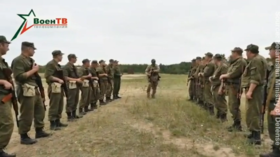
Warsaw previously described the presence of the PMC’s fighters in Belarus as a “potential threat”

FILE PHOTO. © Global Look Press / Capt. Tobias Cukale
Poland will closely monitor the situation in Belarus after the arrival of the first Wagner troops in the country, special services official Stanislaw Zaryn has said. He claimed that Russia may have an agenda behind the private military company’s activities on the territory of its ally.
Wagner mercenaries “are now set to train the Belarusian army and settle in locations that have been prepared for them,” Zaryn said in a video on Twitter, citing the “latest intelligence.” The Defense Ministry in Minsk openly confirmed on Friday that Wagner members were training Belarusian troops and sharing the battlefield experience they had gained from the Ukraine conflict.
The Belarusian ministry also said it had developed a “road map” for military training together with the Wagner leadership. A news outlet affiliated with the ministry published a video featuring exercises with Belarusian territorial defense forces that involved Wagner instructors.
Zaryn, who serves as deputy minister coordinator of Poland’s special services, stated that “several hundred” mercenaries had arrived in Belarus but that the “extent of their involvement” in activities in the country “is still unknown.” Polish intelligence continues to monitor the situation, he added, insisting that Warsaw “remains vigilant.”

Read more
The deputy minister further claimed that “one thing is for sure: the Wagner Group is being deployed to Belarus to accomplish a mission of some kind. The Kremlin has always used this and other [private military companies] to push its agenda.” He did not provide any evidence to substantiate those allegations.
The Wagner Group was given the option to move to Belarus as part of a deal with the Kremlin mediated by Minsk, ending a mutiny staged by the company’s founder, Evgeny Prigozhin.
In late June, Prigozhin accused the Russian Defense Ministry of staging a fatal missile strike on a Wagner camp, vowing retaliation and declaring a ‘march for justice’ on Moscow. He abandoned his plans in exchange for a deal brokered by Belarusian President Alexander Lukashenko.
Wagner troops were given the option of either returning to civilian life, signing contracts with the Russian Defense Ministry, or moving to Belarus. Lukashenko, who also offered to host Prigozhin himself in Belarus, said he was “not worried” about the presence of Wagner, adding that it could be used to defend his country.
The development sparked concern in Warsaw, and Polish President Andrzej Duda claimed in late June that “the Wagner Group’s presence in Belarus could be a potential threat to Poland.”




